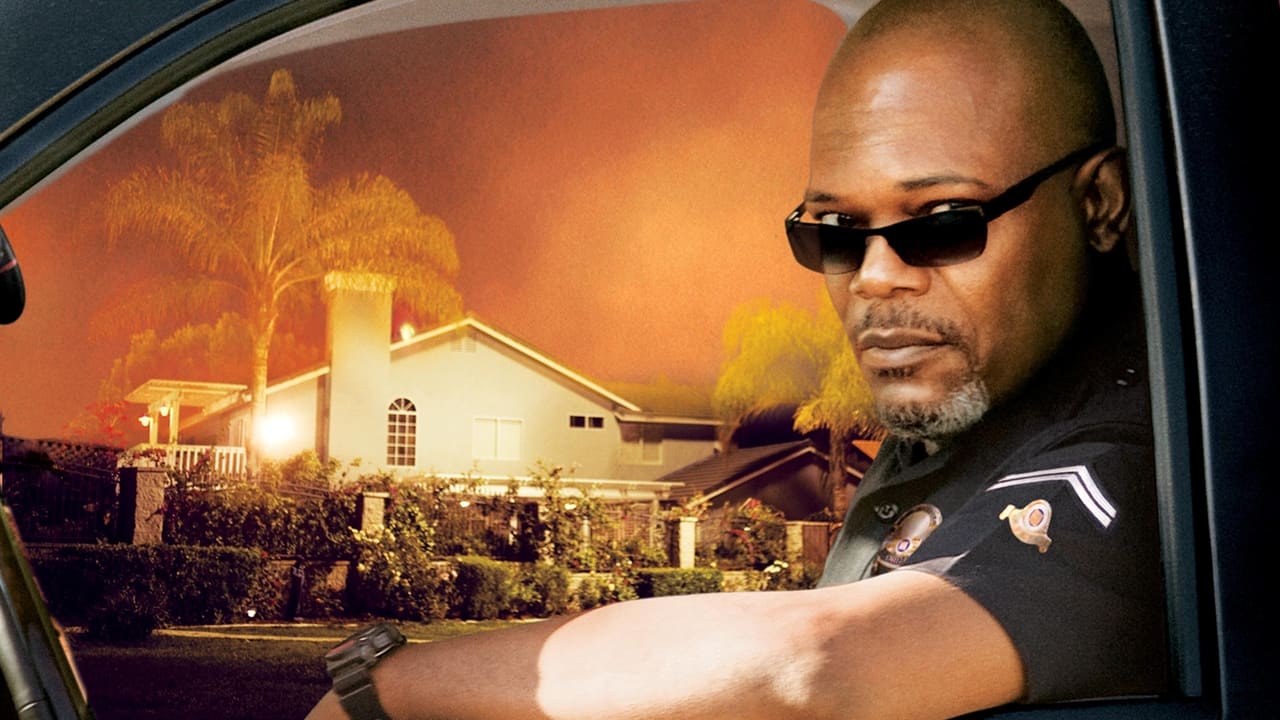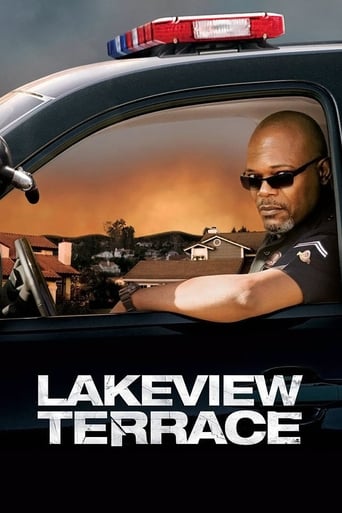Mjeteconer
Just perfect...
Infamousta
brilliant actors, brilliant editing
Tyreece Hulme
One of the best movies of the year! Incredible from the beginning to the end.
Jerrie
It's a good bad... and worth a popcorn matinée. While it's easy to lament what could have been...
lizziechow
With so many lengthy reviews already written, it's hard to add anything new. Like many, I thought this deserved more stars than the average number it has received. A.T's suspicions of his wife's infidelity with a white man makes the movie's story-line plausible. It's easy to understand his motivations, even as I wished the cinematography could be a little bit more sympathetic towards his story (to give the story more depth). While the film got us riled up against an "old man"/"conservative" who couldn't and wouldn't accept an interracial marriage, a closer viewing brings into perspective the class disparity between the two families on Lakeview Terrace. A.T doesn't have a pool, but the interracial couple does. It is also the backdrop of many turning points in the film. I watched this on HBOHD many years (almost 10 years) after it was released, and was struck by how little human nature has remained constant in comparison to the changes in technology (a flip phone). The psychology exhibited in this thriller is even more relevant today, and I feel it is what makes this a movie worth watching.
Brandon Hazey
I rented this movie after seeing it on IMDb. Seeing the so so rating I didn't expect too much from it. I was terrified by the role of Samuel L Jackson. What a performance! Personally I think The idea could have easily walked the narrow border of an A/B movie. Thanks to Samuel's performance, the rest of the cast, and the screenplay plus directing, it was a very good movie. In fact it left me sweating of fear what will happen next (that same feeling you get with certain horror flicks). The story talks to me personally, I am married to a woman from a different ethnic race than myself, and have been dealing with racism ever since I met her. Even from within our own families. To have a man like, Abel Turner as my neighbor would be killing. I don't know what I would do, I might do the same as this movie predicts.I rate this movie more than IMDb, cause it certainly deserves a higher rating than a 6.2. It deserves a 7.3, at least. But because it's lower than it should be I shall rate it an 8!
krlmilky
The movie Lakeview Terrace is a movie about a racist Los Angeles Police Department sergeant who terrorizes his new next door neighbors because they are an interracial couple. The sergeant, Abel Turner, played by Samuel L. Jackson, is a single father of two children. Turner is particularly tough on his two children, but seems especially tough after they witness the next door neighbors, Chris (Patrick Wilson) and Lisa Mattson (Kerry Washington), having sexual relations in their pool. The theme that is presented throughout the movie is a theme of racial intolerance.The movie begins with Chris and Lisa Mattson moving into the Lakeview Terrace neighborhood as Abel's children, Marcus and Celia are on their way to school. After spying to see who his new neighbors are , Abel sees Chris and Lisa kissing, and he is disgusted. He is also disgusted at the fact that his two children witness Chris and Lisa having sexual relations in their pool. Later that evening, Abel positions his floodlights to shine into Chris and Lisa's bedroom window. They awaken in the middle of the night unhappy about the lights, and after some discussion, Chris decides he will discuss with Abel at the next opportunity. When Chris is finally able to speak with Abel about the lights, Abel maintains that the lights are part of his complex security system and won't be able to do anything. The next day, Abel shows his intolerance once again by telling Chris that no matter how much he listens to rap music, he will always be white. This scene was the first scene where Abel verbally showed he may in fact be a racist; it was also the scene where he welcomed Chris to the neighborhood. Abel also alludes to the fact of being a possible racist in the bar scene when he describes how his wife was killed. He explains that his wife was with her white boss at the time of her car accident. He goes on to explain that he didn't know why his wife would have been in the car with her white boss when she should have been at work, providing at-home care. Here, Abel is implying that his wife was unfaithful to him, which may explain why Abel does not like interracial couples.The director used the technique of wild-fire motifs in the movie to depict the toxic relationship between Turner and the Mattson's. The raging, burning wild-fires in the movie shows how toxic the relationship between the neighbors had grown from the beginning of the film. The Mattson's and Turner have a heated exchange outside after the Mattson's plant a line of trees on the boundary line between the two properties. The exchange almost leads to an altercation, but both parties are able to hold it off and go their separate ways. The director also used the technique of low-key lighting in the film – this type of lighting puts most of the set in shadow. The scene where we see low-key lighting would be when the Mattson's are awakened out of their sleep from Turner's bright floodlights. Their bedroom was dark enough and when the light shined through the windows, it cast Chris's shadow along the wall as he got out of bed to check to see what was going on with the lighting. The darkness of the low-key lighting goes with the theme of racial intolerance in that if one acts out like Turner, it can make you a pretty dark person.In conclusion, the theme of racial intolerance is ironic in this movie because a person would feel that having a police officer as a neighbor would be a good thing. In this case, it was not a good thing at all. The Mattson's felt all but safe.
James Hitchcock
For years, Hollywood has tended to shy away from the sensitive subject of racially mixed marriages, but in recent years there have been signs that the taboo has been weakening. "Mirrors", for example, featured a racially mixed couple, and "Lakeview Terrace", another film from 2008, is an "issue" movie centred upon that very theme. (In both films the husband is white and the wife black; Hollywood still seems reluctant to make films dealing with the opposite situation, which is in fact statistically more common in real life).The film takes its title from a racially mixed middle-class neighbourhood in Los Angeles. The central characters are a young interracial couple, Chris and Lisa Mattson, and their next-door neighbour Abel Turner, a black officer with the LAPD, with whom they have a tense, uneasy relationship which soon degenerates into open hostility.The film starts off as an examination of two conflicting lifestyles. Abel, a widowed father of two young children, is considerably older than the Mattsons and is more politically and socially conservative; he is, for example, sceptical about global warming and keen to defend the police against allegations of brutality. He is a strict father, something shown by the way in which he constant corrects his children whenever they make a grammatical error. Chris and Lisa, by contrast, are more cosmopolitan and liberal; it is ironic that Chris, the young white professional, is a fan of hip hop music, generally regarded as the music of working-class urban blacks.Abel is sometimes described as a racist, but his is a specialised form of racism. He is not prejudiced against white people per se; he is happy to live in a racially mixed area, and would have no objection to living next door to an all-white couple, especially if they shared his social attitudes. He does, however, object to mixed marriages, and this is one of the reasons why he dislikes Chris and Lisa. This attitude may derive from an incident in his past. He was widowed when his wife was killed in a road accident alongside her white boss, with whom he believes (possibly incorrectly) she was having an affair.In the second half of the film it turns into an example of what I have come to regard as the "…… from Hell" movie. The basic premise of such films is that the life of the protagonist is turned upside-down by the arrival of a stranger who initially seems friendly but who quickly turns out to be dangerous. (This sub-genre of the thriller enjoyed great popularity in the late eighties and early nineties following the success of "Fatal Attraction", or "One Night Stand from Hell"). In this case it is Abel who is the villain and Chris and Lisa his victims; they may have to some extend provoked him, but his behaviour degenerates from the merely unneighbourly to the criminal to the murderous.I have given Lakeview Terrace a relatively high mark because of the original way in which its ideas are developed in the first part of the film and because of the quality of the acting, especially from Samuel L. Jackson as Abel, or at least the Abel of the early scenes. He is portrayed as a proud man, one with a short temper, but a loving if strict father, doing his best to get his kids off to a good start in life, and Jackson is able to bring out all these facets of his character, as well as hinting at the possible latent violence underlying the surface.Nevertheless it was in my view unfortunate that the scriptwriters and director Neil LaBute allowed the film to turn into a "….from Hell" movie, because the first half is actually much more interesting. Abel might end up as the neighbour from Hell, but at first he himself has several legitimate causes of complaint about the behaviour of the Mattsons. (They have been making love in their outdoor swimming-pool, in full view of Abel's children, and Chris has been flicking cigarette butts over his fence). By slavishly following the conventions of the conventional suspense thriller, the film loses the opportunity to examined the little-explored phenomenon of black conservatism and the way in which it conflicts with the cosmopolitan liberalism of many- both black and white- in the younger generation. It would appear that in Hollywood it is still OK to make a black man the villain, provided that he is sufficiently reactionary to offend against the canons of political correctness. A more conciliatory or nuanced ending might have made for a more interesting film. 7/10

